Champion Insights: Aurora
Aurora is different. She’s a vastaya capable of seeing (and traversing) the spirit realm, unlike most. She’s a friend to and healer of troubled spirits, unlike certain other champions. And, arguably most importantly, she managed to befriend Ornn.
And, much like the bespectacled, freckled ginger bunny witch, her development story is different as well. Her story begins around six years ago, starting with a champion idea, splintering off into Sylas, Yone, Spirit Blossom, Fiddlesticks' VGU, and culminating in Aurora herself.
We’re sure you’re wondering, “what does a bunny with a floppy hat and equally floppy ears have in common with a primordial demon?” Well, to answer that, we need to go back to the beginning.
The Witch-Who-Never-Was
The year is 2018: The rune system has just been reforged, you’re getting one-shot by Zoe, and the ADC-killing patch 8.11 hadn’t yet brought misery to bot lane.
“I had just joined the Champions Team and was told I’d be working with Squad5 a lot, so we had a chat while sitting outside under a tree on a cool autumn day,” recalls lead concept artist Sunny “Kindlejack” Pandita. “He told me that he wanted to be a great designer and make these cool f*&^ing champions. And we kinda shook hands and were like, together we will ascend this mountain and do this.”
And so, Kindlejack started to draw.
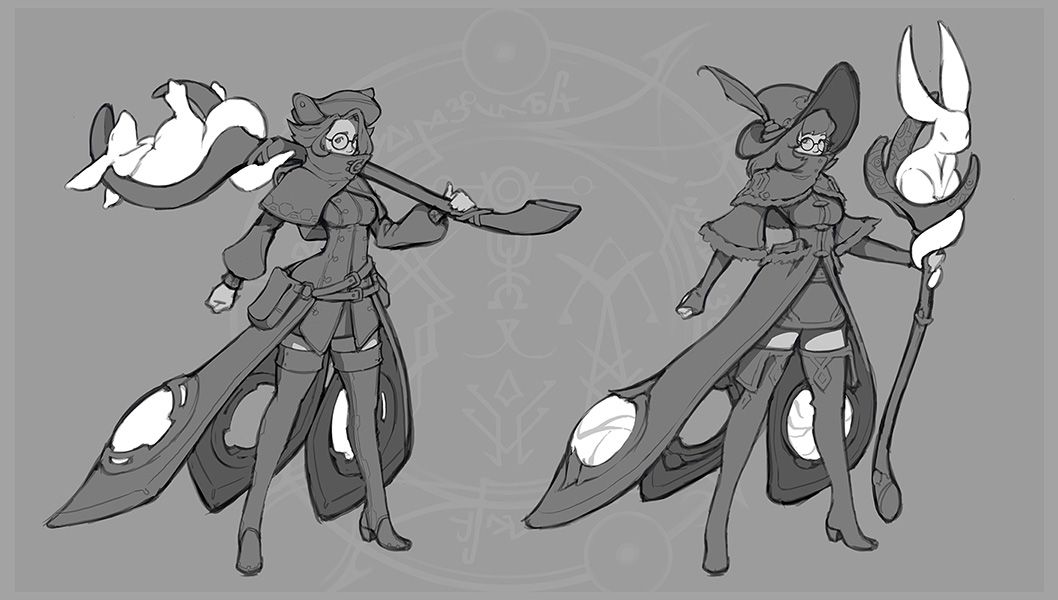
Aurora’s earliest concepts were broad: a dancer who creates stories out of smoke, a mage who combines elements to create different magic. But there was one that everyone just kept returning to... the bunny witch wielding spirit magic.
Word of the bunny witch with glasses began to spread across the League dev team, and people quickly fell in love. When game design manager Blake “Squad5” Smith started with the kit, he narrowed in on a then-unexplored fantasy that seemed to fit perfectly with Aurora’s theme.
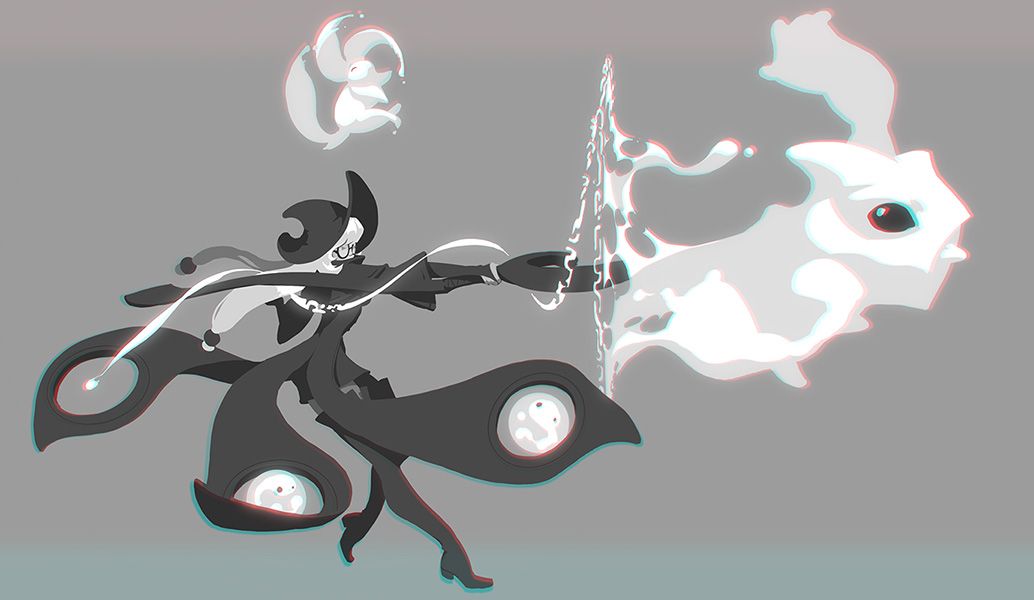
“I really liked the idea of doing a summoner-type character, but that caused a lot of confusion because it means different things to different people,” Squad5 explains. “People think of something like Pokémon where you summon something that’s constantly with you. But I wanted a Final Fantasy-style summon where you bring out a powerful creature, they do something cool, and then go away. So that kit caused a lot of confusion, and we ended up pivoting to something else.”
The direction the team ended up pursuing was a genius mage who could understand magic simply by seeing it. Someone who could copy your magic. Someone who could... steal your ult?
“By this point people were playtesting her. They really loved the kit and felt like spell stealing was a fun skill expression, but we got pretty mixed results for everything combined. People kept saying stealing spells felt too evil for her!” Squad5 laughs. “And we didn’t want her to feel villainous or arrogant.”
That meant the team had to make a tough decision: redo the kit or redo the character. They then created Sylas.
But the work didn’t go to waste. The kit turned into Sylas, some aspects of her personality became Lillia, and the research the team did into the Spirit Realm helped shape Yone, Spirit Blossom, and even helped with Fiddlesticks’ demon lore.
That said, the champion as we knew it was gone, destined to rest in a folder alongside Ao Shin and others.
Until...
“When Riot Lexical became the Champions Team lead she asked us to present some ideas that we were interested in pursuing. And that’s when I knew it was time. We had been thinking about this champion for four or five years at this point—we had concept spreads, gameplay ideas, and narrative hooks. And so she said, ‘Oh I love bunnies. Let’s give it a try,’” Kindlejack laughs.
The catch? The team needed to start from scratch.
Hippity Hoppity, Making a Vastaya Bunny Properly
When you’ve been thinking about a character for almost six years, it turns out it’s pretty hard to just “start from scratch.”
“I had been hearing about Aurora since I joined the team. Everything I heard about her was just... I love bunnies, I love witchcraft, I love everything about this character, and she needed a writer,” explains senior narrative writer Elyse “apothecarie” Lemoine. “I knew that Riot Lexical wanted us to start over, but after talking to Kindlejack, we all really felt that the original character was so strong and we should go back.”
It has been a while since we made a vastayan character—Sett being the last—and besides, bunny girls are preeetty damn popular.
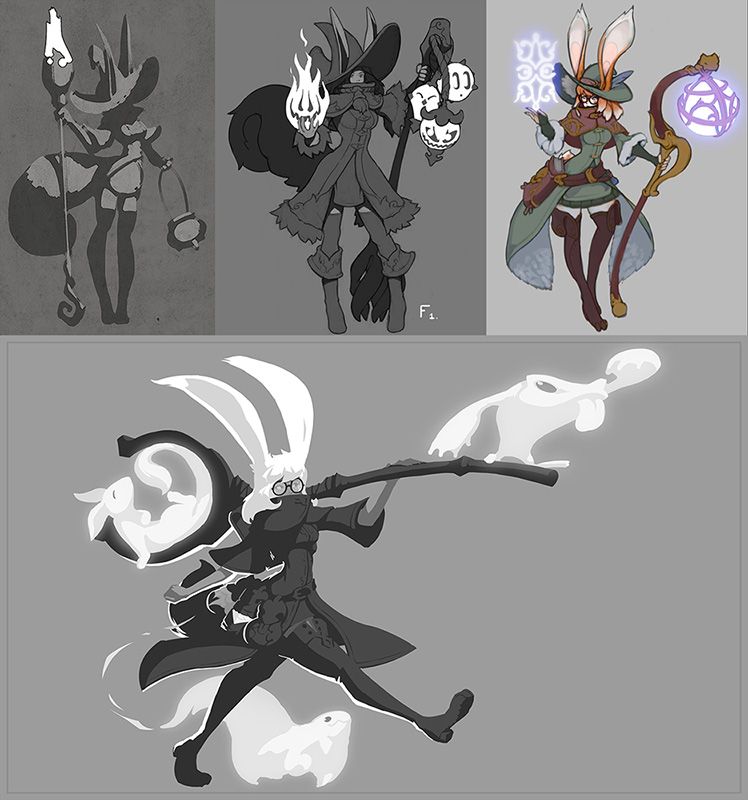
“In my very first piece of concept art I had made years ago, I had a spread of ideas and people kept pointing to one in particular and going, ‘What’s that about?’” Kindlejack laughs.
The image in particular was of a bunny-eared girl with a face hidden in shadow. And, being Runeterra, this meant she was vastaya.
Vastaya are naturally magical creatures descending from the Vastayashai’rei, originating from what is now known as Ionia. Somewhere down the line something magical (and probably a little weird) happened and now the vastaya we know have mixed animalistic properties (Author’s note: Really, it’s when the magic in the Vastayashai’rei stopped enabling them from shapeshifting). The result is vastaya, who are inspired by real-world animals.
Sett’s inspired by badgers and wolverines, Ahri’s a fox, Xayah and Rakan are birds... or foxes—have you seen those grippers? So the team needed to do a bit of research on their own to make Aurora feel like a rabbit without just being a cute girl with rabbit ears and a cotton ball tail.
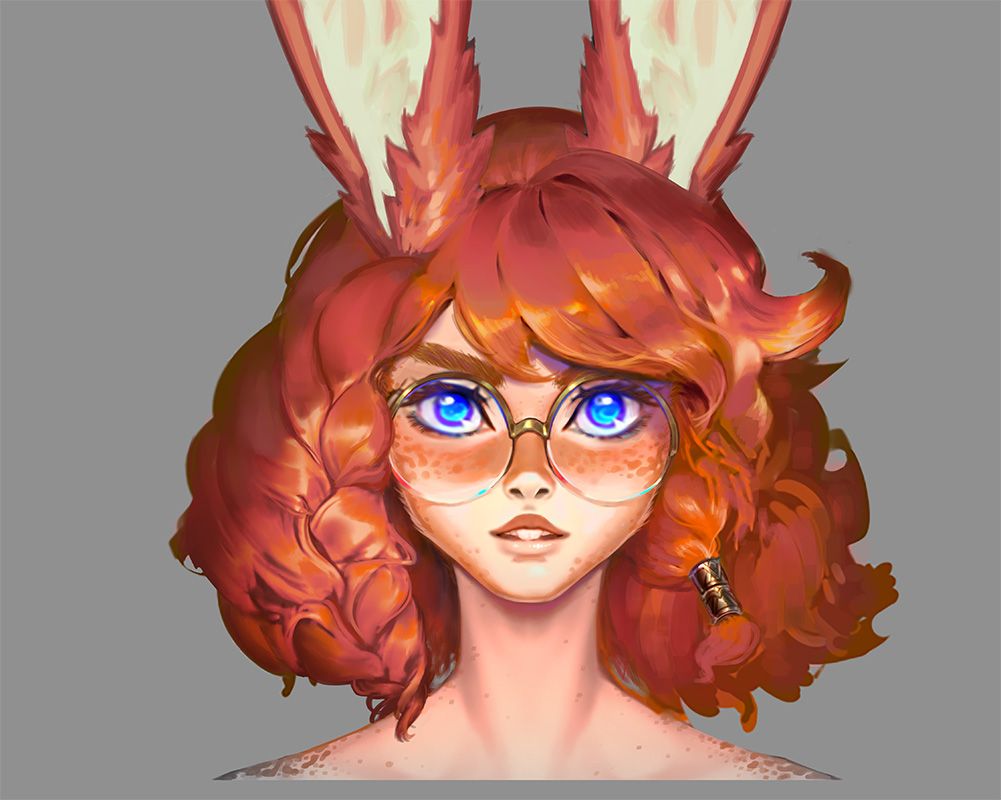
Yes, she does have some fur.
Vastaya share many physical traits with their animal-inspirations: scales, fur, ears, claws, and even markings.
“When trying to figure out her unique ‘vastayan marking’ I really liked the idea of heavy freckles coalescing into patterns,” Kindlejack explains. “They’re in a Turing pattern, meaning that they follow a scientifically predictable pattern, like a leopard’s spots.”
And much like freckles, they carry over onto other parts of her body—mainly her shoulders and thighs. The similarity to freckles seemed like an excellent addition to her ginger hair, a natural nod to her Freljordian home.
Alas, there’s something else we should discuss...
“I never thought I’d need to google anthro feet—and right after Briar—but I braved the rabbit warren,” Kindlejack laments. “Lagomorphs (read: rabbits, hares, and pikas) are one of the few mammals to have fur on their feet. And they don’t have toe beans or pads! I at least wanted to get the feet right.”
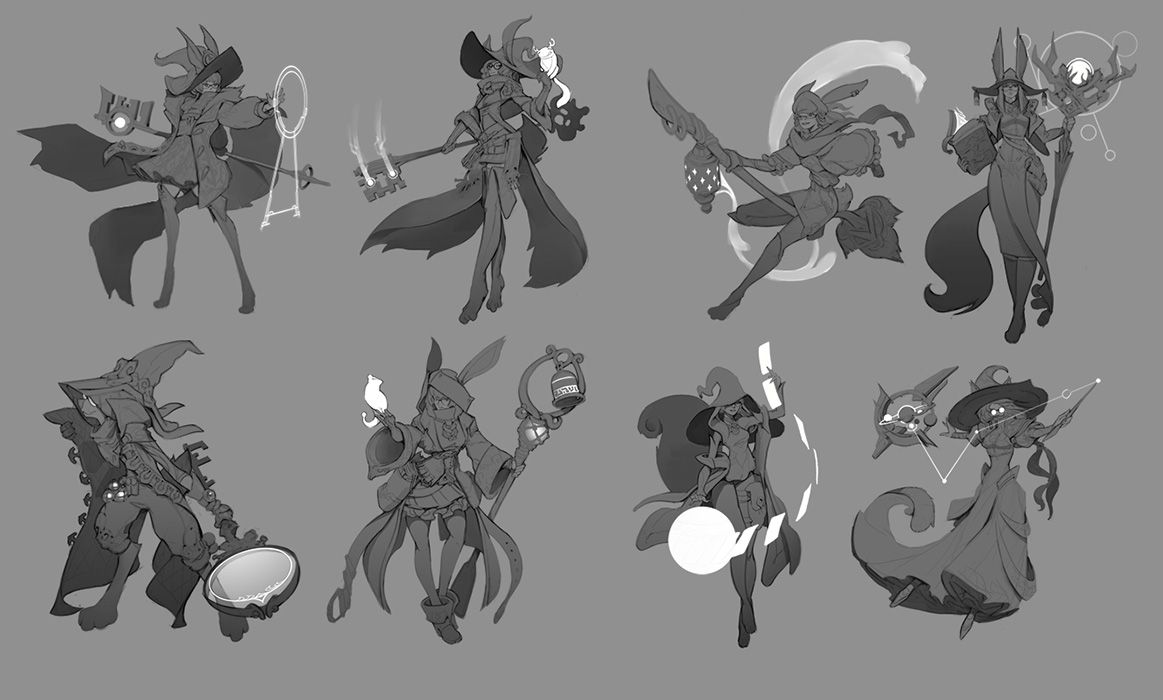
Unlike other Bryni, Aurora stands on her tiptoes.
Aurora is our first prey animal vastaya (Author’s note: Squad5 did insist that fish are not necessarily predators, but admitted that he has never been bitten by a fish). So that left for a unique question to answer... What’s the gameplay fantasy of prey?
“I thought a lot about how a prey animal succeeds against a predator. They don’t usually overpower them, their success is usually found in trickery and eventual escape. And I wanted to bring that to Aurora’s gameplay,” explains Squad5.
Aurora’s very tricky and fast—very flighty. Instead of standing her ground against her opponent, she prefers to outmaneuver them, using her rabbit-like agility to flit around the edges of a fight and outmaneuver her opponent.
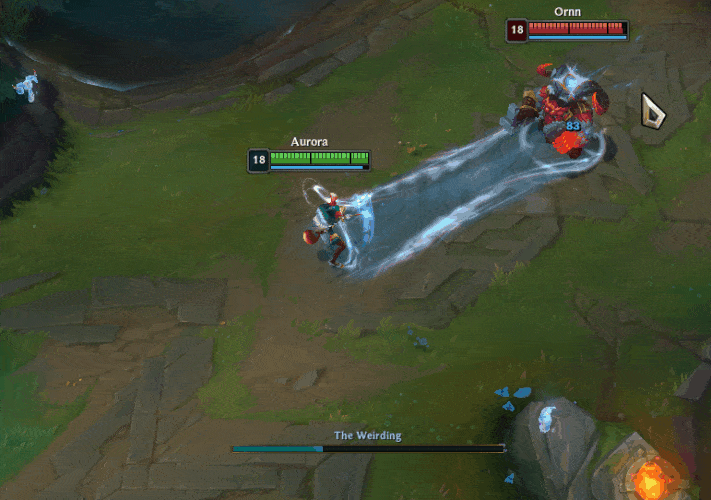
But there was still a problem. Many vastaya champs call Ionia home. And while that’s cool and all, that’s just so... boring. Aurora needed a different home, a different story, and a different connection to the magic that runs through each vastaya.
The Freljordian Witch
Aurora is a Bryni, a rabbit-like type of vastaya. And, like many other vastaya, they found a home in another part of Runeterra: the Freljord.
“Vastaya aren’t just found in Ionia, they are everywhere,” explains apothecarie. “And we thought that Aurora would be an excellent opportunity to look at what life would be like for vastaya outside of Ionia who are less connected to the original source of their magic.”
The Bryni are well-suited to the harsh Freljordian climate, but they are not warriors or mages. Unlike the other vastayan tribes like the Vesani, Lhotlan, or Kiilash, the Bryni have become isolated from other vastaya. Instead, they spend their time farming the Freljordian alpine lands. That said, their inherent vastayan magic isn’t entirely gone—it just shows itself differently, like carrots that are a little too juicy. And then there’s Aurora.
“She was born with this ability and connection to the spirit world that has been gone from her people for a long, long time,” apothecarie says. “She’s different from the other Bryni, she can see spirits and directly interact with the spirit world.”
Aurora wasn’t taught how to use her magic. She had to reverse engineer everything on her own through years of trial and error to craft a spellbook that’s uniquely hers.
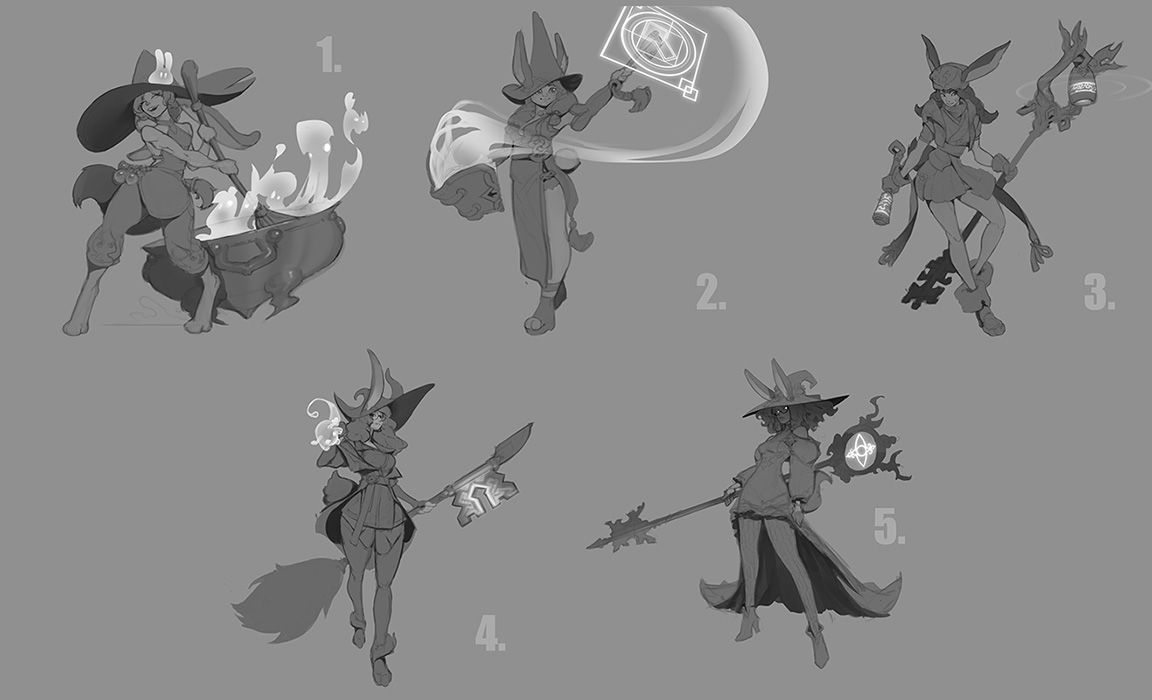
“Witches have become more culturally embraced and reinvented in recent years. We really wanted to do the cottagecore, modern take on witchcraft that’s more about spirituality rather than paganism or dark magic,” Kindlejack says
“Aurora’s magic is one that she learned and taught herself, so I wanted the visual elements of it to be unique from the magic you see other vastaya use. It is a bit disparate and darker to offset the cuteness of being a bunny. I looked at some Hindu and traditional Middle Eastern motifs, and infused them with Freljordian rune and design shape language.”
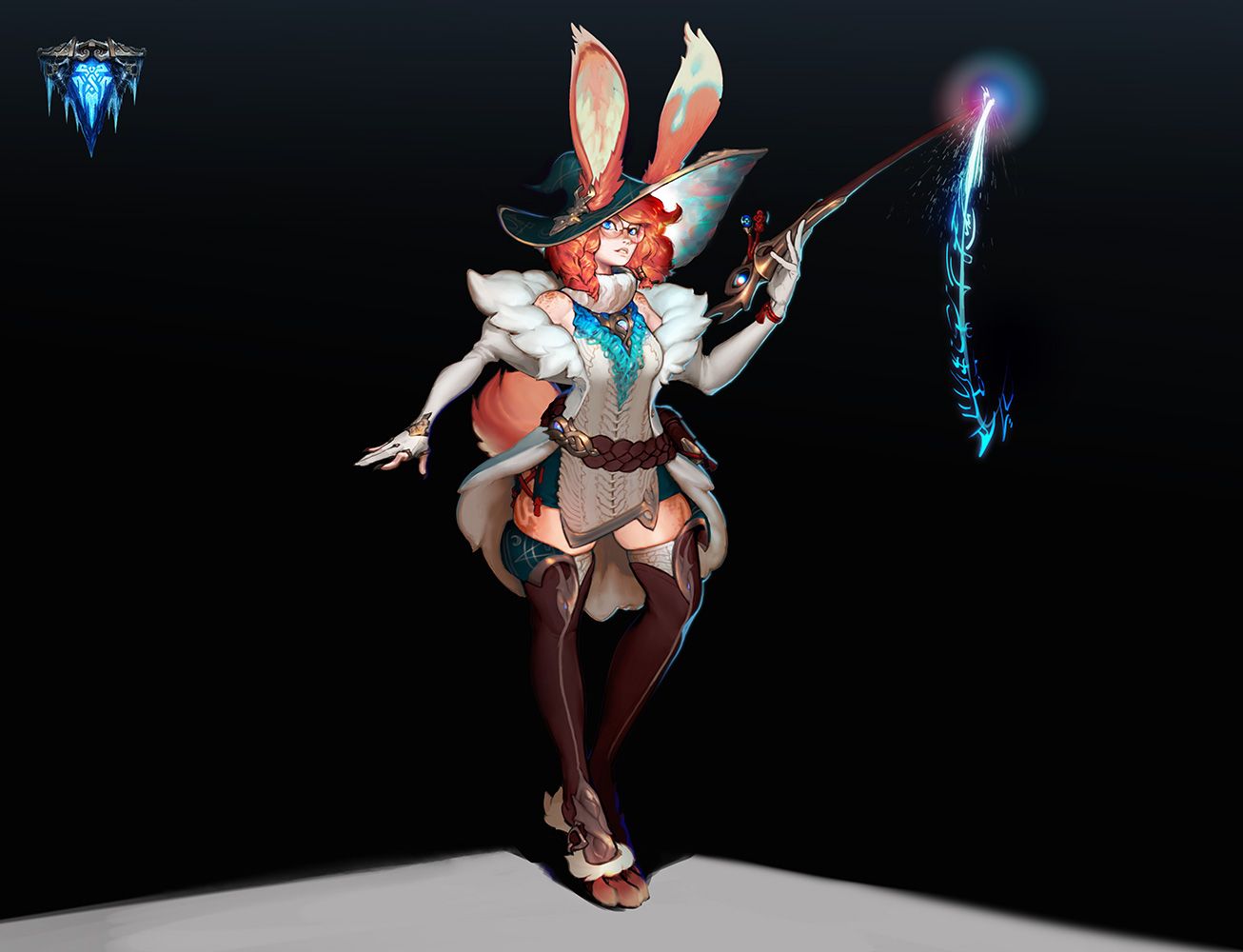
Aurora’s unique magical design elements can be seen on her wand, necklace, clothing, earrings, and in her magic.
“When you think of a witch—even a good witch—what they’re doing always feels a little bit mysterious and dark, shrouded in mystery, which is what feels different from a wizard, sorcerer, or other magical archetypes,” Squad5 says. “Her Q is an example of that, she’s basically putting a curse on you, which becomes empowered and she uses that to kill you. She basically rips out a little bit of your soul.”
Her ultimate, which definitely leans into the twicky wabbit fantasy that Squad5 wanted, also draws inspiration from a particular place in another game.
“Getting lost in the Lost Woods in Zelda was a formative experience for me,” Squad5 laughs. “I want her ult to give you a similar feeling. You try to get out and then are just teleported back to the center, unable to escape her magic.”
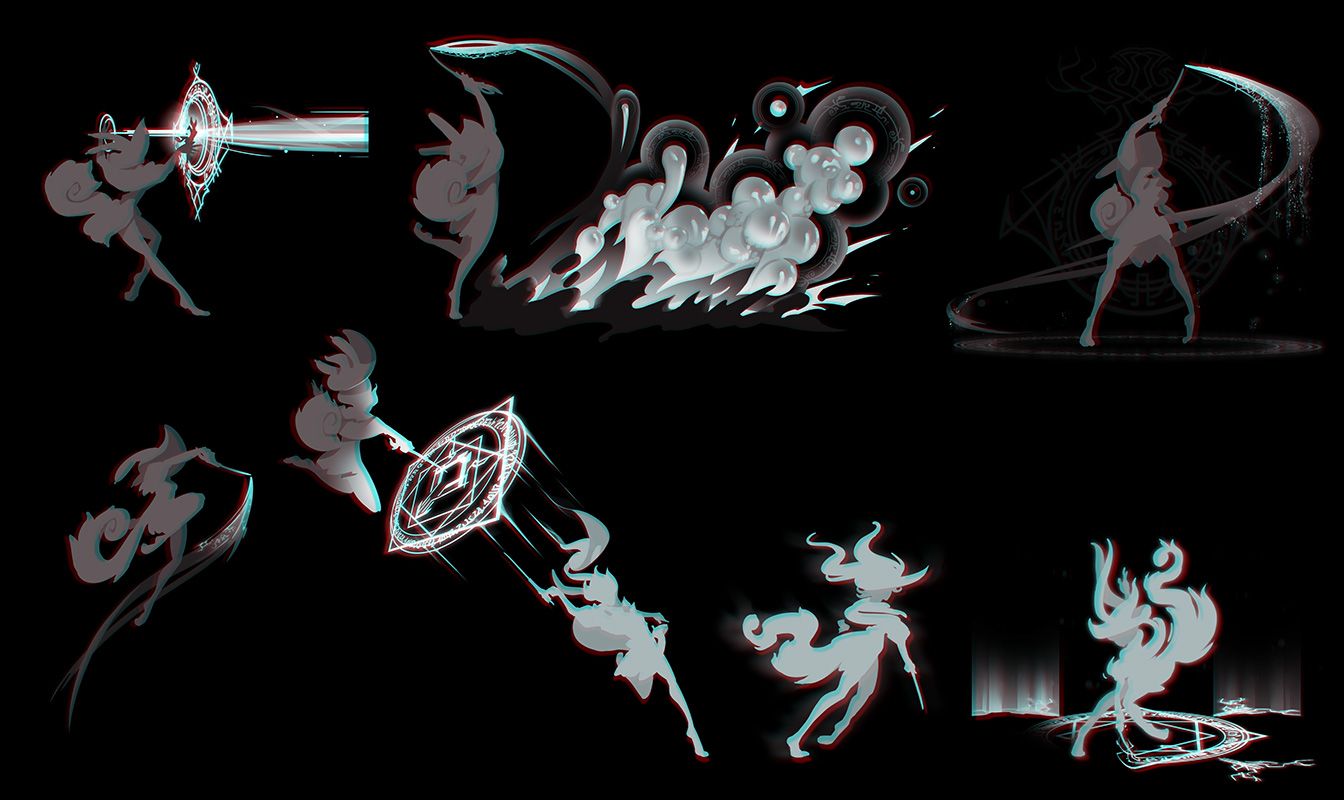
To Walk Between Worlds
“We really like when new champions explore a space that is unexplored,” Kindlejack shares. “Every champion should shine a little bit of light onto a part of the world we haven’t seen yet. And we hadn’t really explored the spirit realm much. We had seen it, yes, but we didn’t even know if it interacted with Runeterra, or what kinds of creatures lived there.”
The spirit realm is an interesting place. It’s the source of vastayan power, permanent home to Alune, and (kinda, sorta) where Mordekaiser teleports you when he takes you to Brazil ults you.
“The spirit realm is sort of an overlay of the mortal realm that we see in Runeterra. And most of the stuff we’ve seen about the spirit realm has been located in Ionia, which has a very symbiotic relationship with the spirits. When I was working on Spirit Guard Udyr, I talked to another writer a lot about what spirits, and the spirit realm, in the Freljord are like,” recalls apothecarie.
But it’s more than just an overlay, it mirrors its corresponding parts of Runeterra. The spirits in Ionia have mostly known peace (until the war with Noxus, which has caused a rise of azakana), but the Freljordian spirits are much different... wilder.
“We did tons of explorations to figure out what exactly the inhabitants of the spirit realm are. I actually took a list of things that were potentially spirits and talked to the narrative team to figure out what was and what wasn’t a spirit. Kindred? Yes, spirit. Volibear? Spirit. Bard’s whole thing? Not spirits.”
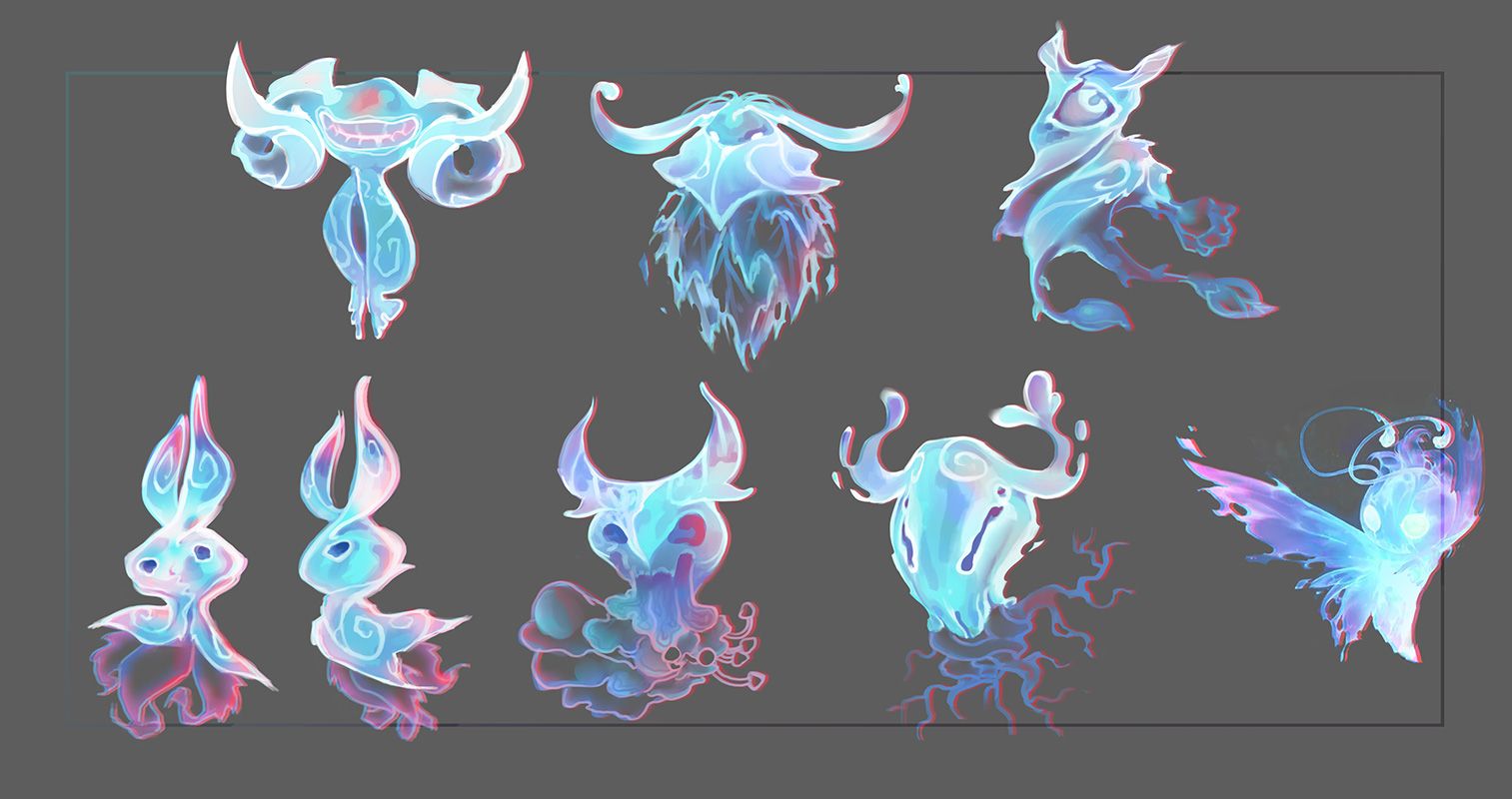
The spirits take on the physical characteristics of creatures that exist in the Freljord, but they are not the spirits of dead animals or people.
Aurora looks at the Freljordian spirits—who may look creepy and uncomfortable at first glance—as if they are adorable little creatures to be cherished and protected, not like abominations who should be feared or, even worse, destroyed.
She feels most comfortable with them. They’re her passion, her special interest, her friends.
“Speaking to my own personal experiences, Aurora interacts with spirits the way I do with animals,” Kindlejack smiles. “I’m always the person who ignores the people at parties and goes to pet the cat or play with the dog. It’s not that I connect with animals because they’re on a different wavelength, they’re just a lot easier and more consistent to read than people are.”
“Aurora isn’t a particularly violent person, but if someone is messing with the spirits, she’s going to do her research and then kick the s*&^ out of you,” apothecarie laughs.
From the day she was born, Aurora has been able to see the spirits and interact with them in her world. And at some point, she learned to enter the spirit realm.
Aurora sometimes finds the mortal realm to be overwhelming. Large crowds, loud noises, long conversations, and group social interactions are things she’s especially sensitive to. And so when she feels overwhelmed, she has an easy escape: the spirit realm.
Her years of studying has made it so she can hop in and out of the spirit realm with ease, or well, aided by a few rituals (inspired by real-world mudras). So when she feels overwhelmed by sensory information, she’s able to quickly escape.
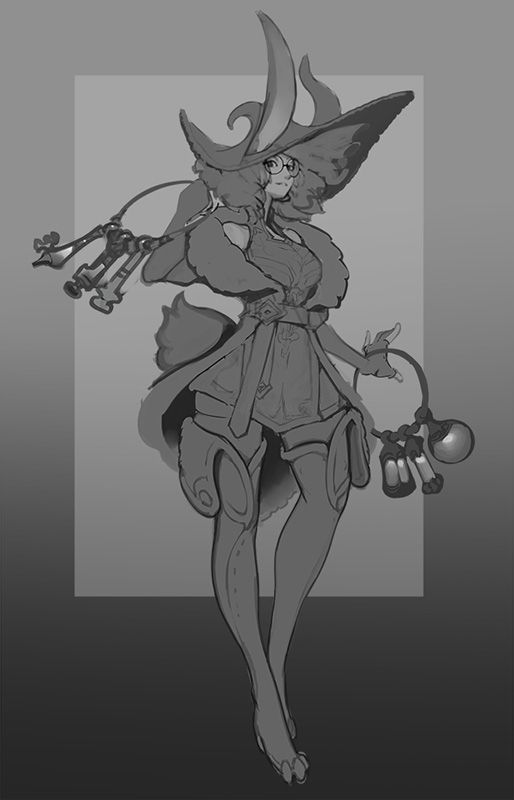
Aurora wants to help all spirits. Whether they’re powerful demi-gods like Volibear or Ornn, or nameless creatures, she’s there to provide a helping hand.
In our world we have a term to describe Aurora: She’s autistic. But Runeterra doesn’t have a term to describe her. She’s just Aurora.
Many members of Aurora’s dev team, and of Riot overall, were inspired to share some of their experiences as people on the spectrum. Because for them she was a chance to bring a part of their lives to the game they love.
“It’s impossible to fully encapsulate the autistic experience because it’s a spectrum, because everyone experiences it so differently,” apothecarie explains. “There are a lot of things that a lot of us do that we wanted to capture, like toe walking, which is really common! But we know that it’s not something everyone does. And we wanted to kind of capture not just the common autism experiences a lot of us have had, but the most basic part of having autism. Which is that the way our brains work—the way we view the world. It doesn’t match the expectations that others have. And that’s really what we want to shine through for Aurora. She shouldn’t meet expectations.”
She should set new ones.
When One Journey Ends, Another Begins
Aurora’s development happened over years—years of thinking, of drawing, of writing, of designing.
“It’s fun to look back on everything we put into Aurora. When Squad5 and I started on this champion, we expected her to be the first one we made. And now we’re like four or five champions together later, and we’re finally coming around to making good on our original promise,” Kindlejack recalls. “But instead of doing it as the start of our adventure together, we’re now meeting together at the summit.”
But while this part of her story is over, her next chapter remains to be written.